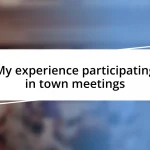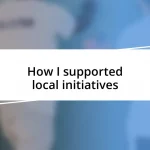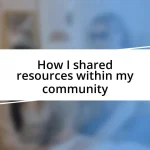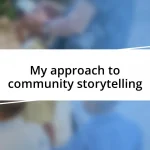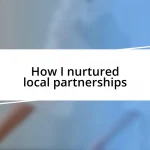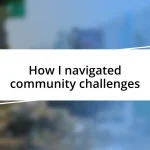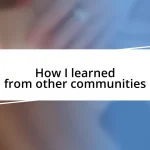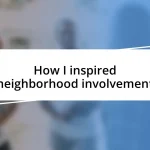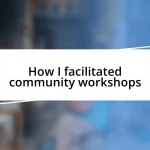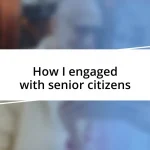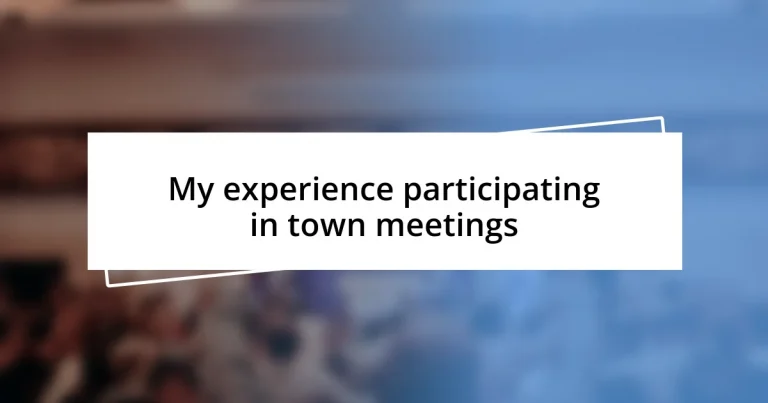Key takeaways:
- Town meetings foster community engagement, empowering individuals to voice concerns and contribute to local decision-making.
- Preparation, such as researching agenda items and articulating key points, enhances participation and confidence.
- Sharing personal experiences can create empathy and strengthen connections among community members.
- Leading by example, creating opportunities for dialogue, and recognizing contributions motivate greater community involvement.
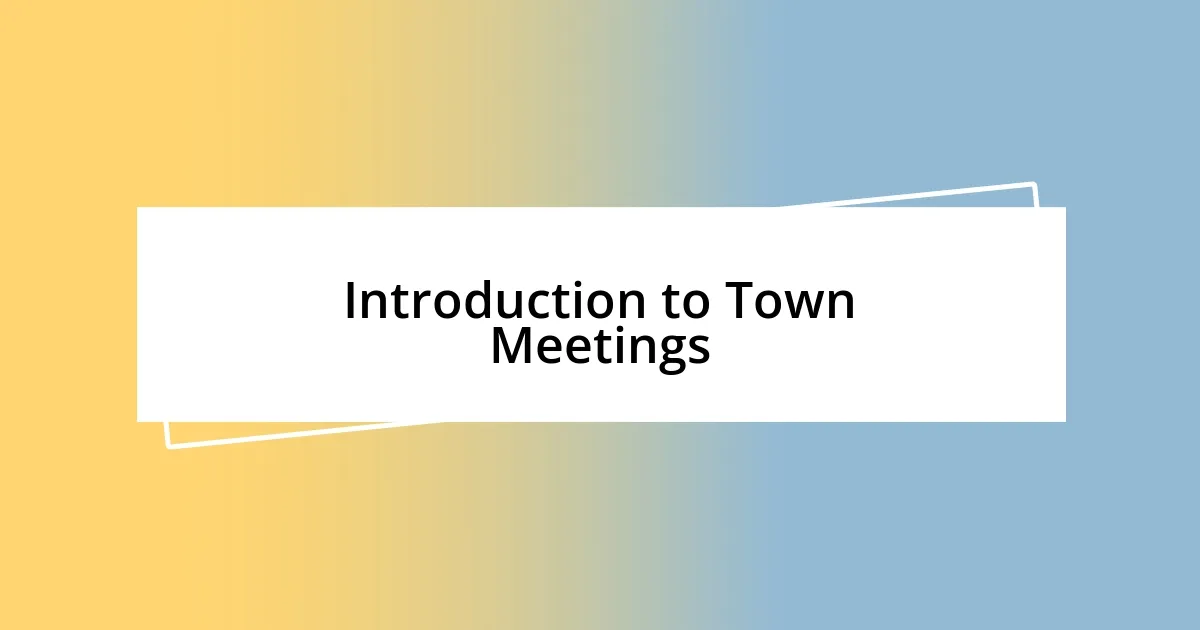
Introduction to Town Meetings
Town meetings are fascinating gatherings where community members come together to discuss issues that affect their daily lives. I remember my first town meeting vividly; I was both nervous and excited to voice my concerns about a local park’s maintenance. There’s something empowering about being in a room full of people who are equally passionate about their community, isn’t there?
These meetings often serve as a platform for residents to engage with local leaders and decision-makers. I once listened intently as a neighbor passionately shared their vision for a new bike path, and I couldn’t help but reflect on how this type of open dialogue fosters a sense of belonging. Have you ever felt that thrill of participating in a democratic process right in your own backyard?
In my experience, attending town meetings has not only informed me about local issues but also inspired me to take action. For example, hearing about budget allocations opened my eyes to the complexities of community funding. These discussions shape the very fabric of our neighborhoods, making it crucial for each of us to get involved and share our perspectives.
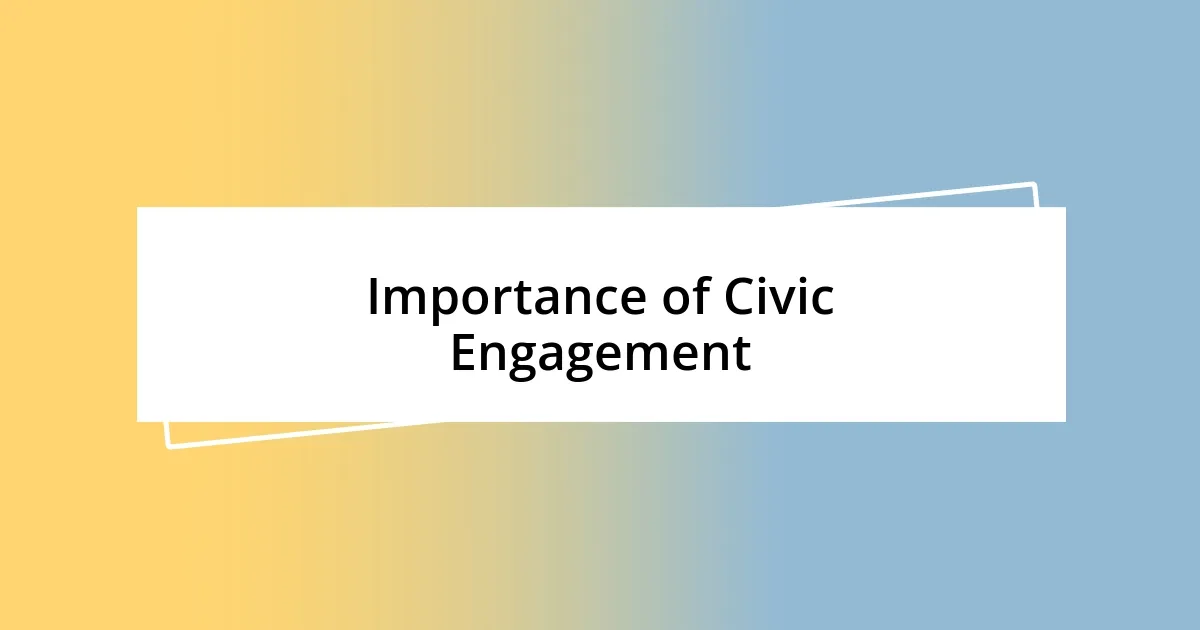
Importance of Civic Engagement
Civic engagement is vital for fostering a robust democracy. When I participated in my first town meeting, I truly realized how each voice matters. I felt a sense of hope as others voiced their opinions, building a collective spirit that can lead to actionable change. Being part of this dialogue helped me appreciate the intricate balance between governance and the community, highlighting how crucial our involvement is in shaping our collective future.
- It empowers individuals by giving them a platform to voice concerns and offer solutions.
- Active participation helps to cultivate stronger relationships among community members.
- Engaging in local governance increases accountability among public officials, ensuring they represent constituents’ interests.
- It brings diverse perspectives together, enriching the decision-making process.
- Such involvement can inspire others to take action, creating a ripple effect of civic responsibility.
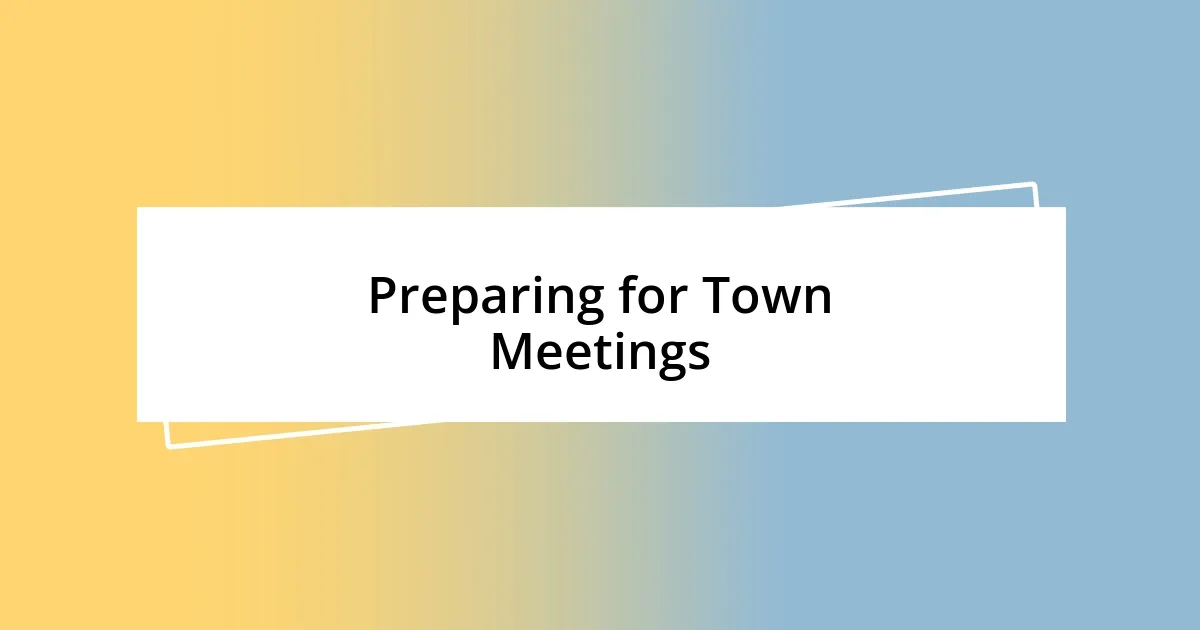
Preparing for Town Meetings
Preparing for town meetings involves a bit more than simply showing up. From my perspective, the real preparation starts with gathering information about the agenda. I’ve learned that when I familiarize myself with the topics being discussed, I feel much more confident in expressing my thoughts. One time, I invested a few hours researching the proposed zoning changes before a meeting, which allowed me to join the conversation with a clearer understanding of the implications for our neighborhood.
Another key element in my preparation routine is to jot down specific points I want to address. I remember feeling overwhelmed at my first town meeting, trying to articulate my concerns on the spot. Now, armed with notes, I can engage in dialogue with clarity and purpose. Additionally, discussing these points with friends before the meeting can provide valuable feedback and perhaps even inspire new ideas.
Finally, let’s not overlook the power of mindset. Arriving early and taking a moment to breathe and gather my thoughts has made a significant difference in my experience. Reflecting on why I’m there—not just to voice my opinion, but to contribute to a stronger community—fuels my passion for participation. Each meeting feels like a unique opportunity to connect with dedicated individuals who share my commitment to improving our town.
| Preparation Steps | Impact on Participation |
|---|---|
| Research Agenda | Increased confidence in discussions |
| Make Notes | Clear articulation of thoughts |
| Arrive Early | Set a focused, positive mindset |
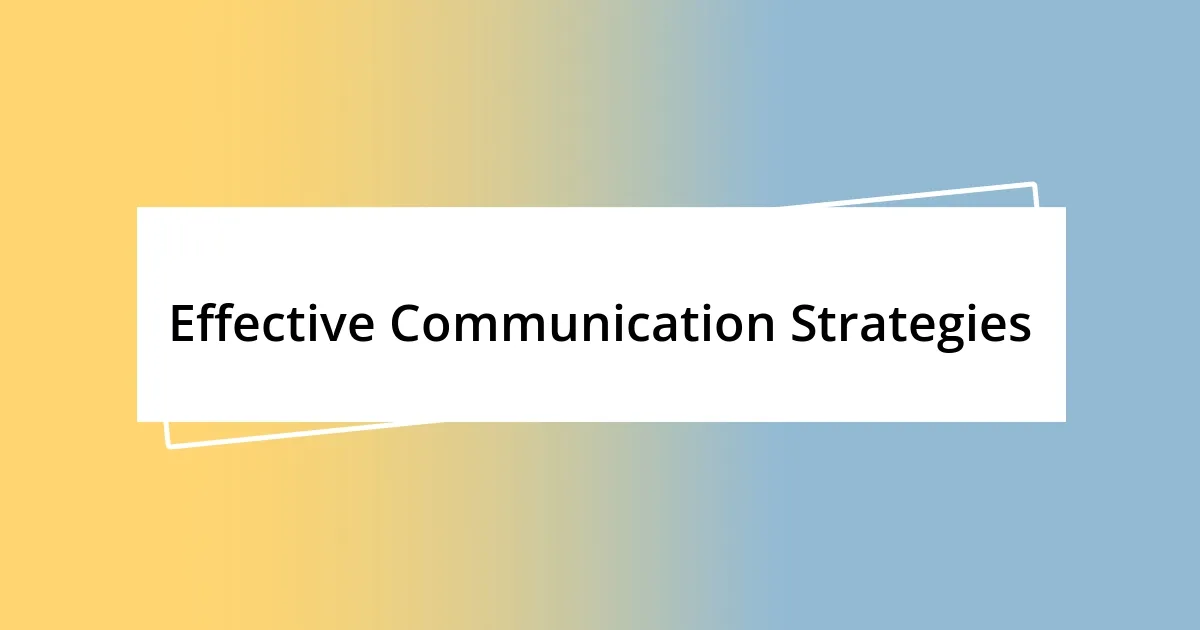
Effective Communication Strategies
Effective communication is at the heart of meaningful participation in town meetings. I’ve found that using simple, direct language helps in conveying my thoughts clearly. When I was nervous about sharing a controversial opinion, I took a moment to focus on framing my points simply, asking myself, “How would I explain this to a friend?” This approach not only clarified my message but also made it more relatable for everyone listening.
Listening is just as crucial as speaking, and I learned this the hard way. The first time I attended a town meeting, I was so focused on what I wanted to say that I overlooked the valuable insights from others. I realized that by actively listening to different perspectives, I could synthesize ideas and contribute more effectively. It transformed the way I engaged with the community, turning conversations into collaborative problem-solving.
Finally, body language is an often-overlooked aspect of communication. I remember sitting at a table during a heated discussion, feeling nervous and tense, but when I consciously relaxed my posture and made eye contact, everything changed. I noticed that my anxiety lessened and I felt more connected to those around me. How we present ourselves can either invite dialogue or shut it down, so I make it a point to be open and approachable. Each encounter is a chance to build a rapport, and I cherish those moments of connection.

Sharing Personal Experiences
Sharing personal experiences can be a powerful way to connect with others in a town meeting setting. I recall a particular moment when I courageously shared my story about our local park’s declining condition. As I spoke about the memories I had there as a child, I saw heads nodding in agreement. It made me realize how personal anecdotes can create a ripple effect, fostering empathy and sparking further discussion among attendees.
Another unforgettable instance was when I learned from a fellow participant who shared their family’s struggle with finding affordable housing. Their heartfelt account evoked so many emotions in the room, and I genuinely felt the weight of their words. It struck me that sharing personal experiences isn’t just about presenting facts; it’s also about making ourselves vulnerable. This vulnerability can break down barriers and encourage others to share their truths too.
I often wonder, what if everyone dedicated just a few moments to share their experiences? Imagine the depth of understanding we’d foster in our community. Each story is a thread in a greater tapestry, weaving us together in our shared challenges and victories. I’ve found that opening up often invites a sense of belonging and a collective purpose, reminding us that we’re not alone in our endeavors.
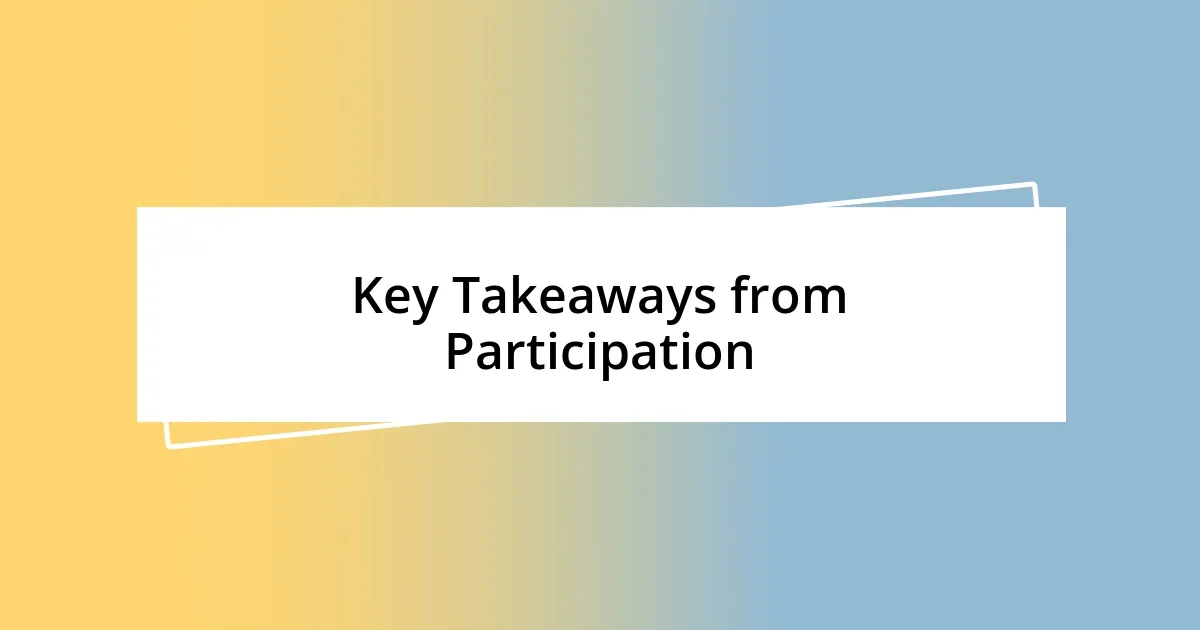
Key Takeaways from Participation
Participating in town meetings has taught me the importance of staying open-minded. I remember attending a session focused on community safety. Initially, I felt defensive about my neighborhood issues, but when a participant shared their positive experiences with local initiatives, it shifted my perspective. Their enthusiasm was contagious and showed me that every challenge can have a potential solution if we are willing to listen and collaborate.
Another key takeaway is the unexpected sense of community that blossoms in these meetings. During one meeting, as I sat among my neighbors, I could feel a palpable energy; we were all there for the same reason—to make our community better. In that moment, I realized that our differences were actually our strengths. How often do we find ourselves in spaces that blend diverse thoughts and aspirations? The camaraderie that developed from those conversations was empowering, pushing me to remain involved and active in local issues.
Moreover, I’ve discovered that follow-ups are crucial after these gatherings. One time, after discussing local transportation improvements, I took the initiative to reach out to fellow attendees to form a small group. This collective effort not only solidified our ideas but also laid the groundwork for actionable change. Have you ever thought of how a simple follow-up can transform a discussion into tangible outcomes? It’s these connections and continued conversations that turn ideas into reality.
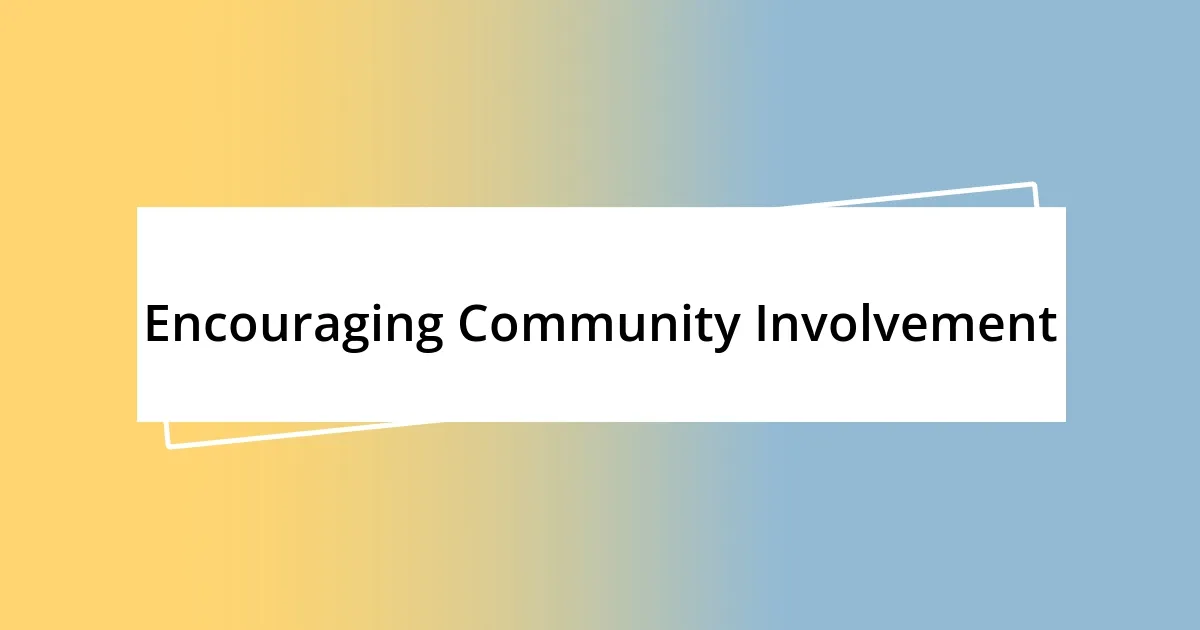
Encouraging Community Involvement
When it comes to encouraging community involvement, I find that leading by example can be incredibly effective. One evening, I decided to host a casual meet-up in my backyard, inviting neighbors to discuss upcoming town issues over some homemade snacks. It was heartwarming to see people who often passed each other on the street suddenly opening up and sharing their thoughts. That simple gesture turned a group of hesitant acquaintances into a collaborative team—who knew that a few cookies could spark such meaningful conversations?
Creating opportunities for dialogue also plays a significant role in fostering engagement. I remember organizing a local clean-up event and how, at first, participation was lukewarm. But as soon as I shared my dream of transforming our neglected park, something clicked. People began to express their ideas—how we’d like to see butterfly gardens and picnic areas—and within hours, we were all invested in a shared vision. Don’t you think it’s amazing how a common goal can unite diverse voices in a neighborhood?
Finally, I’ve noticed that recognizing individuals for their contributions can really motivate others to join the conversation. Once, during a town meeting, I saw a woman shyly volunteering to speak about her initiative to support local artisans. I stood up, applauded her effort, and added how essential it was for our community’s growth. The room erupted in support, and suddenly it became a platform for more voices to be heard. Isn’t it inspiring how a little acknowledgment can encourage others to step outside their comfort zones? The ripple effect from those moments only reinforces the importance of lifting each other up.
